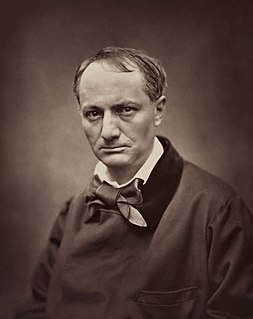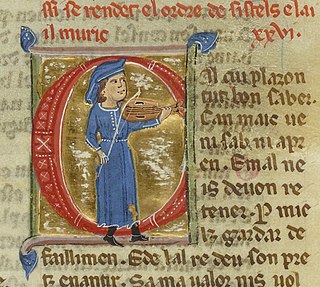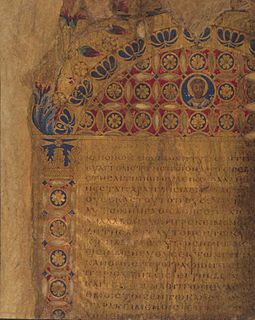Related Research Articles

Charles Pierre Baudelaire was a French poet who also produced notable work as an essayist and art critic. His poems exhibit mastery in the handling of rhyme and rhythm, contain an exoticism inherited from Romantics, but are based on observations of real life.

Dylan Marlais Thomas was a Welsh poet and writer whose works include the poems "Do not go gentle into that good night" and "And death shall have no dominion"; the "play for voices" Under Milk Wood; and stories and radio broadcasts such as A Child's Christmas in Wales and Portrait of the Artist as a Young Dog. He became widely popular in his lifetime and remained so after his death at the age of 39 in New York City. By then he had acquired a reputation, which he had encouraged, as a "roistering, drunken and doomed poet".

Quintus Horatius Flaccus, known in the English-speaking world as Horace, was the leading Roman lyric poet during the time of Augustus. The rhetorician Quintilian regarded his Odes as just about the only Latin lyrics worth reading: "He can be lofty sometimes, yet he is also full of charm and grace, versatile in his figures, and felicitously daring in his choice of words."
Latin literature includes the essays, histories, poems, plays, and other writings written in the Latin language. The beginning of formal Latin literature dates to 240 BC, when the first stage play was performed in Rome. Latin literature would flourish for the next six centuries. The classical era of Latin literature can be roughly divided into the following periods: Early Latin literature, The Golden Age, The Imperial Period and Late Antiquity.

Sappho was an Archaic Greek poet from Eresos or Mytilene on the island of Lesbos. Sappho is known for her lyric poetry, written to be sung while accompanied by music. In ancient times, Sappho was widely regarded as one of the greatest lyric poets and was given names such as the "Tenth Muse" and "The Poetess". Most of Sappho's poetry is now lost, and what is extant has mostly survived in fragmentary form; only the "Ode to Aphrodite" is certainly complete. As well as lyric poetry, ancient commentators claimed that Sappho wrote elegiac and iambic poetry. Three epigrams attributed to Sappho are extant, but these are actually Hellenistic imitations of Sappho's style.

Pūblius Ovidius Nāsō, known in English as Ovid, was a Roman poet who lived during the reign of Augustus. He was a contemporary of the older Virgil and Horace, with whom he is often ranked as one of the three canonical poets of Latin literature. The Imperial scholar Quintilian considered him the last of the Latin love elegists. Although Ovid enjoyed enormous popularity during his lifetime, the emperor Augustus banished him to a remote province on the Black Sea, where he remained until his death.

A troubadour was a composer and performer of Old Occitan lyric poetry during the High Middle Ages (1100–1350). Since the word troubadour is etymologically masculine, a female troubadour is usually called a trobairitz.

La Vita Nuova or Vita Nova is a text by Dante Alighieri published in 1294. It is an expression of the medieval genre of courtly love in a prosimetrum style, a combination of both prose and verse.
Occitan literature is a body of texts written in Occitan, mostly in the south of France. It was the first literature in a Romance language and inspired the rise of vernacular literature throughout medieval Europe. Occitan literature's Golden Age was in the 12th century, when a rich and complex body of lyrical poetry was produced by troubadours writing in Old Occitan, which still survives to this day. Although Catalan is considered by some a variety of Occitan, this article will not deal with Catalan literature, which started diverging from its Southern French counterpart in the late 13th century.

Constantine Peter Cavafy was a Greek poet, journalist and civil servant from Alexandria. His work, as one translator put it, "holds the historical and the erotic in a single embrace."

"In Memoriam A.H.H." is a poem by the British poet Alfred, Lord Tennyson, published in 1850. It is a requiem for the poet's beloved Cambridge friend Arthur Henry Hallam, who died suddenly of a cerebral haemorrhage in Vienna in 1833, aged 22. It contains some of Tennyson's most accomplished lyrical work, and is an unusually sustained exercise in lyric verse. It is widely considered to be one of the greatest poems of the 19th century.

Guido Cavalcanti was an Italian poet. He was also a friend and intellectual influence on Dante Alighieri.
Italian literature is written in the Italian language, particularly within Italy. It may also refer to literature written by Italians or in Italy in other languages spoken in Italy, often languages that are closely related to modern Italian. Italian literature begins in the 12th century when in different regions of the peninsula the Italian vernacular started to be used in a literary manner. The Ritmo laurenziano is the first extant document of Italian literature.

The Sicilian School was a small community of Sicilian and mainland Italian poets gathered around Frederick II, most of them belonging to his imperial court. Headed by Giacomo da Lentini, they produced more than 300 poems of courtly love between 1230 and 1266, the experiment being continued after Frederick's death by his son, Manfred.

Byzantine literature is the Greek literature of the Middle Ages, whether written in the territory of the Byzantine Empire or outside its borders. It forms the second period in the history of Greek literature after Ancient Greek literature.

Robert Gould was a significant voice in Restoration poetry in England.
Sonnet 29 is one of 154 sonnets written by the English playwright and poet William Shakespeare. It is part of the Fair Youth sequence. In the sonnet, the speaker bemoans his status as an outcast and failure but feels better upon thinking of his beloved. Sonnet 29 is written in the typical Shakespearean sonnet form, having 14 lines of iambic pentameter ending in a rhymed couplet.
Portuguese poetry refers to diverse kinds of poetic writings produced in Portuguese. The article covers historical accounts of poetry from other countries where Portuguese or variations of the language are spoken. The article covers Portuguese poetry produced from the Middle Ages to the present era.
The literature of Kosovo is composed of literary texts written in the Albanian, Serbian, Bosnian and Turkish language, specifically by authors of Kosovo. Kosovo produced several prominent writers in the Ottoman era. However, Ottoman authorities banned the written use of the Albanian language until 1912. This policy continued during Serb rule until the outbreak of World War II.
The Traveller; or, a Prospect of Society (1764) is a philosophical poem by Oliver Goldsmith. In heroic verse of an Augustan style it discusses the causes of happiness and unhappiness in nations. It was the work which first made Goldsmith's name, and is still considered a classic of mid-18th-century poetry.